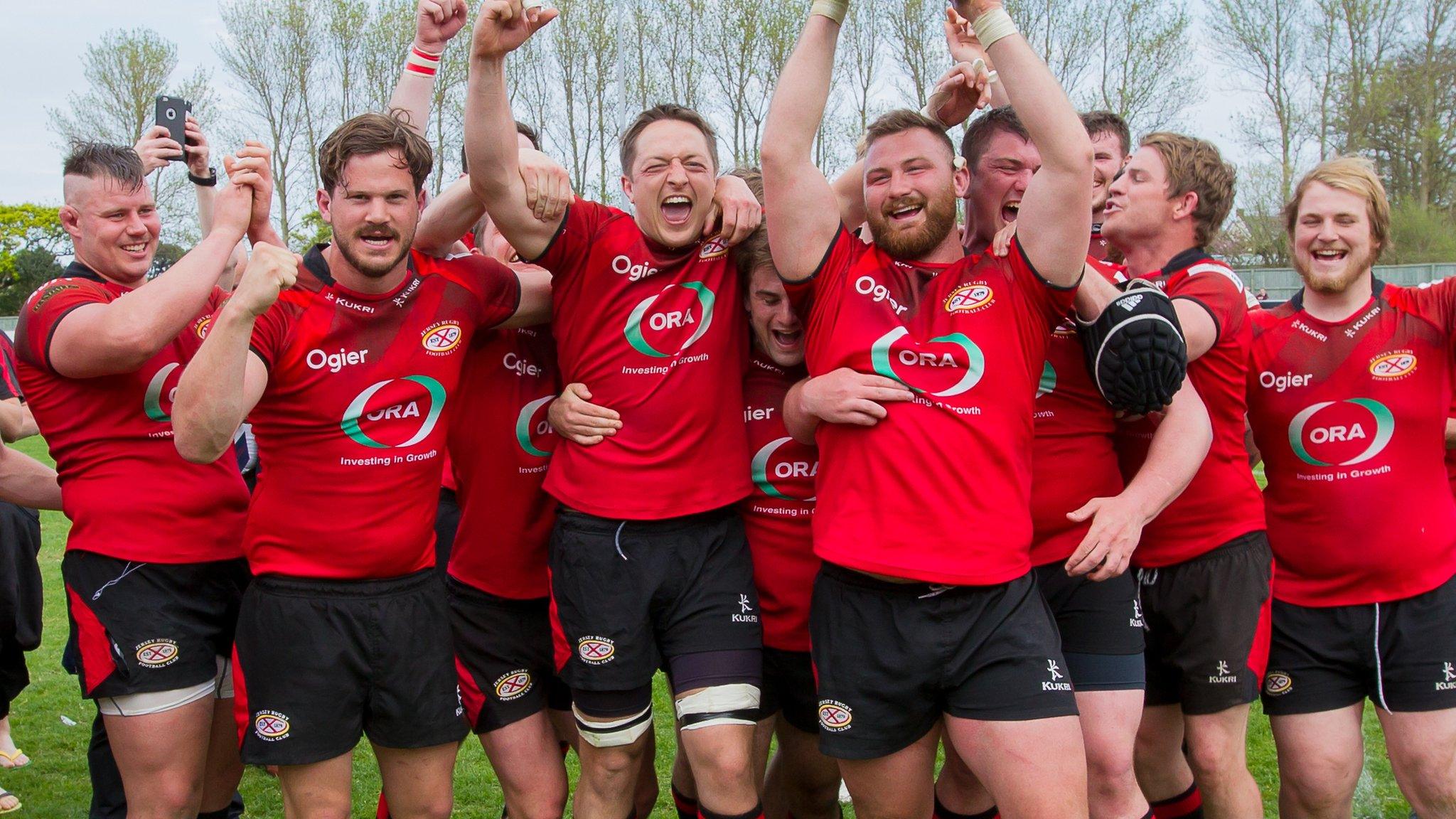RFU Championship: What next for English rugby's troubled second tier?
- Published
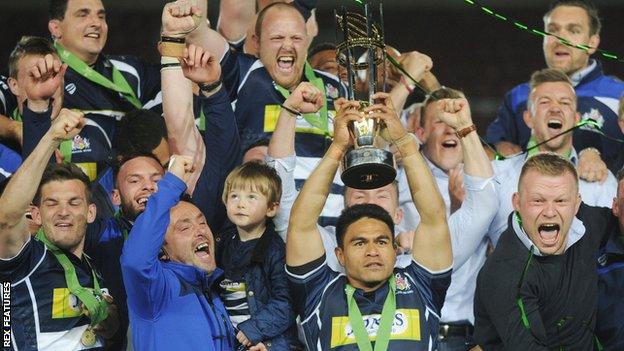
Bristol won promotion to the Premiership last season but it came after years of agonising play-off defeats
Clubs liquidated and expelled, others forced to sell their assets to complete the season and a muddled system for promotion.
English rugby's Championship appears a troubled place, one level below the promised land of the Premiership.
Events at London Welsh - a professional club which now ceases to exist - have shown a host of issues off the pitch are blighting the action on it.
BBC Sport speaks to administrators, club officials, former players and correspondents to investigate if English rugby can sustain a fully professional second tier by looking at:
Troubles defining the competition
Why living on £10,000 as a player is not "the dream"
The finances and future for the league
What is the point of the Championship?
"Nobody has quite worked out what the purpose of the Championship is," Nigel Melville, the Rugby Football Union's director of professional rugby, told BBC Sport when asked to assess its current state.
"Commercially, we're not a very strong product. We've got to look at it in terms of sustainability of our professional game for the long term."
The Championship is made up of three London-based clubs, two from the Home Counties, four from Yorkshire and East Midlands and one each from Cornwall and Jersey.
Melville, a former head coach at Gloucester, and director of rugby at Wasps, has spent his first season as Rob Andrew's successor gauging the mood around the clubs.
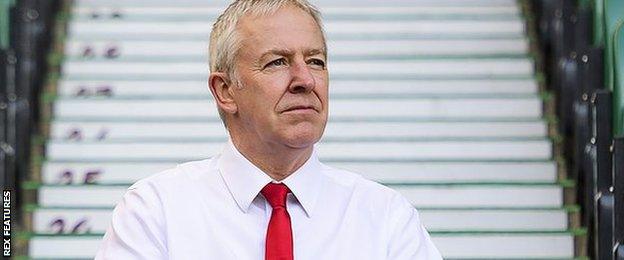
Melville has been working on ideas to revamp the Championship
Having listened, he is set to put his proposals for reform, external to them.
Created in 2009 as a 12-team fully professional competition, the Championship replaced its 16-side predecessor National League One., external This season began as a 12-team competition but, following London Welsh's expulsion, there will be no relegation.
However, the controversial promotion play-off system remains for the top four at the end of the regular season.
This campaign looks set to be the last of this format despite Melville admitting the play-offs have proved the Championship's "most economically successful games".
Helping breed international talent
There is clearly a case to argue for the Championship when it comes to being a springboard to an international career.
When casting an eye through England squads of recent history, a full starting line-up can be assembled of players who have either been contracted to, dual registered or loaned to Championship clubs...
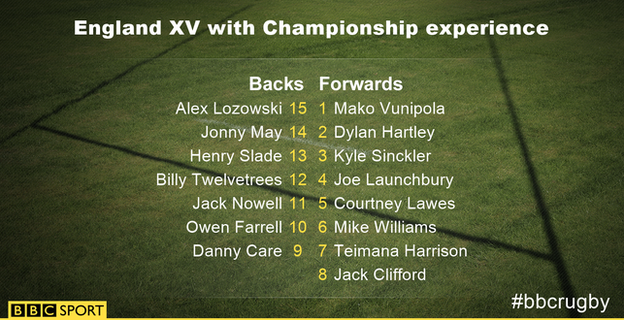
'You can't afford a family on Championship wages'
However, while the Championship has proven to be a career-shaping stepping stone for some of the English game's biggest names, it is also a competition where athletes are on "full-time" contracts worth less than the living wage - allegedly as little as £6,000 in some cases - and where medical insurances are inadequate.
Phil Eggleshaw, a back-row forward who spent seven of his eight years as a professional in the Championship with Doncaster and Nottingham, says it is a league where players "give a lot for little in return".
When he started to plan for a family, he had to choose between his career on the pitch, one blighted by injury, and a stable job away from the sport.

Phil Eggleshaw in action for Nottingham in 2011
"I chose to move away from professional rugby," he wrote in a BBC Sport column, outlining the life of a player in England's second-tier competition.
"So I got a job in the real world and have managed to continue to play part-time for Hull Ionians. Despite being in the third tier, I made more money directly from rugby last year than I had for most of my years as a professional.
"I've recently become a father and feel that if I'd chosen to play on for a living, I couldn't have afforded it. Financially, playing in the Championship would unlikely cover the cost of my monthly bills with a young family."
Eggleshaw also talks about being unable to afford medical insurance and the lack of independent support for athletes.
Chief executive of the Rugby Players' Association (RPA), Damian Hopley, admits the organisation has struggled to represent players in the Championship because of a lack of funds, but says the organisation has long had concerns about wages and insurances in the competition.
'Playing for £10k is not living the dream'
While the RPA receives project funding from the RFU and Premiership Rugby to go into welfare, personal development and insurance projects aimed at top-flight players, Hopley says the organisation lacks the resources to extend to the second tier.
It has, however, given "emergency" support and advice to players at London Welsh, as it previously did to financially troubled Plymouth Albion last year.
"Without the right resources we don't feel it would be appropriate for us to go into the Championship and provide a poor service to the players who deserve better," said Hopley.
"Without the resource, we'd be shooting ourselves in the foot. So that's why we've withheld to this point. We're optimistic, based on the conversations we've had, that there's an appetite around the Championship to make this work."
The undefined status of the Championship as a professional or semi-professional competition is a major issue when dealing with contracts and insurance.
"Player welfare needs to be the number one priority, and to have a semi-professional league where a lot of the players are looked after incredibly well, but it is not standard practice, just doesn't stack up," said Hopley.
"If you're running a professional or semi-professional league you need to have a standard form of contract that players and clubs adhere to, you have to have medical insurance and playing insurances - they are the fundamental welfare provisions for any professional sporting environment.
"Year after year the issue is dodged and ducked by the RFU. This needs to be imposed as a condition on the Championship.
"We all recognise the financial constraints, but there needs to be a line in the sand here around if this is either a professional league, semi-professional league or isn't."

Damian Hopley founded the RPA in 1998 after injury curtailed his playing career
When it comes to remuneration, Hopley said the "national minimum living wage, external is all part of putting on a professional sporting environment".
"From our perspective, we'd like to have a living wage as a minimum to encourage as many players as possible who want to pursue a career in rugby, which as we all know is fraught with danger, difficulty, injury and loss of form.
"Sometimes in the murky corridor of sports, some people think they're above the law and that's absolutely not the case and that needs to be addressed by the employers immediately.
"We've had situations previously in the Premiership where there's been dubious practices around this, but it's a legal requirement.
"It's very difficult for a young athlete who's aspiring to be an international sports person - they get a contract waved under their nose and it's probably all they've dreamt of since they were the age of eight.
"They have a shot at this and want to make the most of it and, while it's not the norm, you certainly have situations where players believe they're living the dream.
"But £10,000 is not living the dream. There needs to be a healthy dose of reality around all of this."
The health of the competition
Each Championship club receives £550,000 in RFU central funding per season, ring-fenced until the summer of 2020.
It is the latest funding revision, with the competition initially set up, external with the RFU promising funding of £2.3m for two years, plus £1m from Premier Rugby for eight years.
The Championship draws in crowds that pale in comparison to the Premiership, with the cumulative total attendance across six matches during the New Year period attracting just over 12,100 spectators - less than half the crowd that watched Saracens beat Leicester at Welford Road on 1 January.
London Irish drew the biggest crowd of that weekend, 4,345 for their win over Bedford at the 24,000-seater Madejski Stadium, while the smallest attendance in the Championship so far this season was 438 at Ealing Trailfinders' match against Jersey in September.
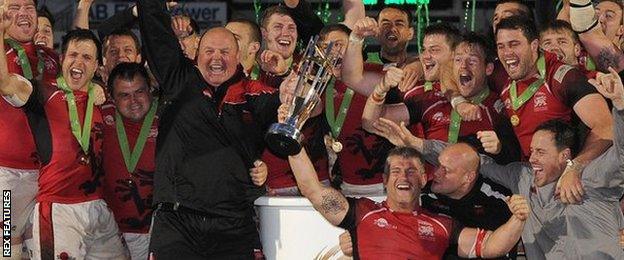
London Welsh players pictured in happier times after securing promotion from the Championship in 2014
The troubled and now expelled London Welsh played in front of as little as 503 spectators at Old Deer Park this season, and only three times attracted crowds of more than 1,000.
In a league which has seen one of Britain's oldest and most famous clubs crumple financially, its economic health is bleak.
As well as London Welsh's demise, in November Jersey were forced to sell assets, including their ground, for £1.5m to "third-party owners" in order to see out the campaign.
BBC Sport studied the latest accounts available at Companies House of nine Championship clubs, discovering only one reported a profit in 2015.
'Not a business opportunity'
One club plying its trade in the second tier made a radical choice before gaining promotion to the Championship, deciding to go against the grain and stay semi-professional.
Richmond are in their first season back in the second tier after the long road back from administration in 1999, which eventually forced them to restart down in level nine.
Last February, as the club began to realise promotion from National 1 was a realistic outcome, it sat the players down and presented the prospect of going it alone as the Championship's only part-timers.
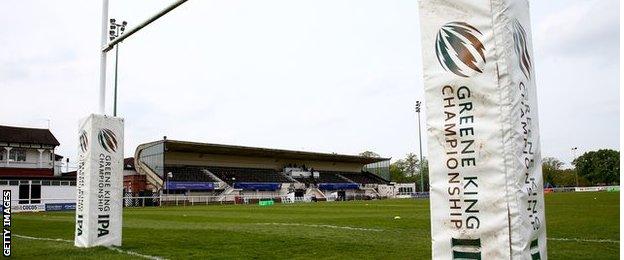
Richmond Athletic Ground is home to two Championship clubs in Richmond and tenants London Scottish
"From an early stage, it was quite clear to us that playing in the Championship is not a business opportunity," chairman Peter Moore told BBC Sport.
"Our basic agreement as a board was that it was not going to be possible to break even as a club with a fully professional playing squad. Our objective was to be self-sustainable.
"We decided what we are is a traditional rugby club providing opportunities to play the game from juniors through to men and women and to try to put as professional an infrastructure as possible around the top end."
This might not be an amateur club in the same sense as those pre-1995 - while every playing member pays their £150 annual subscription before being eligible for selection and getting kitted out, senior squad players are on retainers and receive appearance and win bonuses.
But Richmond's bold model could now be adopted by others in the light of events at neighbours London Welsh.
"I think what we've done, because we were brave and decided independently, it's opened a few eyes that it's not out of the question," added Moore.
"We're reaching a point 20 years into the professional era where this competition has no prospect. The reality is it's dependent on the goodwill of benefactors.
"They're getting to the point where they're just tired."
The case for change
"It's not an ideal model," London Irish chief executive Bob Casey told BBC Sport. "It doesn't make a lot of sense."
Casey believes the future structure of the top two tiers should comprise a 14-team Premiership of the clubs who have Premiership academies, which includes Irish and Yorkshire Carnegie.
"People will say, 'oh, he would say that, he's in the Championship'.
"You can have the aspiration for clubs to climb the ladder every three to five years. But they would have to meet minimum criteria.
"The danger of the play-offs is you can't plan in advance and you need things to go right. Recruitment now in professional rugby happens six months to a year out, so you need to be planning well, well in advance."
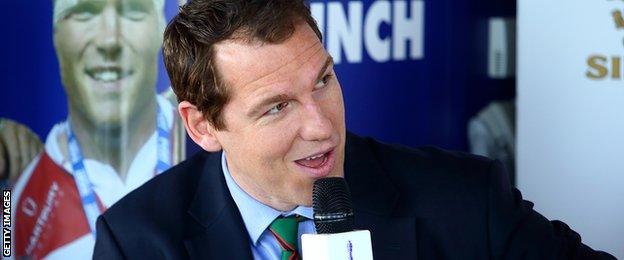
Bob Casey would promote ring-fencing a 14-team Premiership in the future
Neale Harvey, correspondent for The Rugby Paper, suggests a new and more streamlined second professional tier.
"I'd like to see what I'd term a 'Pro Eight' below the Premiership of ambitious clubs with the facility to get promoted," he said.
"What's gone wrong with the current structure is there's such a variety of clubs, all with different models.
"Patently some of them don't work, patently there's different ambitions within clubs such as Bedford, who constantly say they're not interested in promotion.
"If you want to have a second tier that's creditable, that's not really a creditable position.
"With eight professional teams, you could consolidate RFU central funding for the existing 12. That would concentrate talents and create a stronger situation below the Premiership."
What might the future look like?
So are these ideas likely to be mirrored in Melville's impending blueprint for change?
"We're pulling together a plan which I think will help everybody and help fulfil our aspirations in developing young players," he said.
"It's about getting players on to the field playing and preparing to play international rugby.
"Then it's about how we can make the mechanisms between the Premiership, the Championship and the academies work more efficiently for the clubs."
Change appears to be ahead for the structure of the English leagues but sadly for clubs like London Welsh, Melville's plan has come too late.
For the latest rugby union news follow @bbcrugbyunion, external on Twitter.
- Published27 January 2017
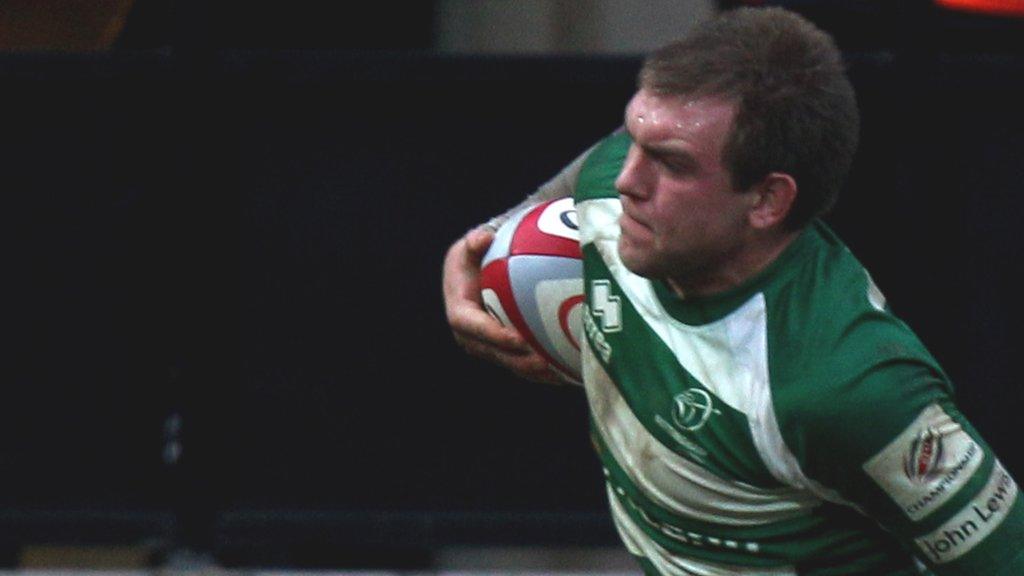
- Published24 January 2017
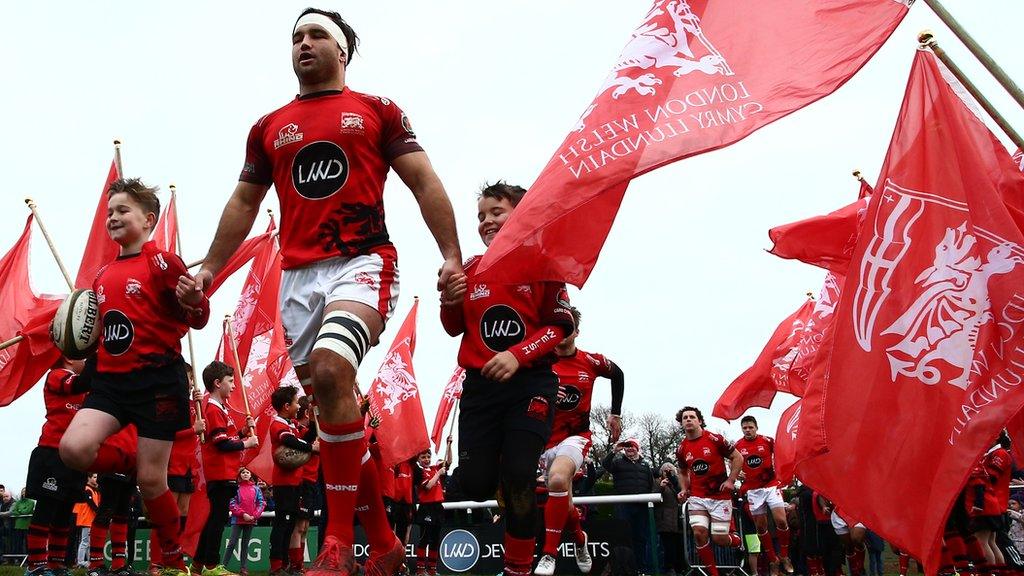
- Published11 January 2017
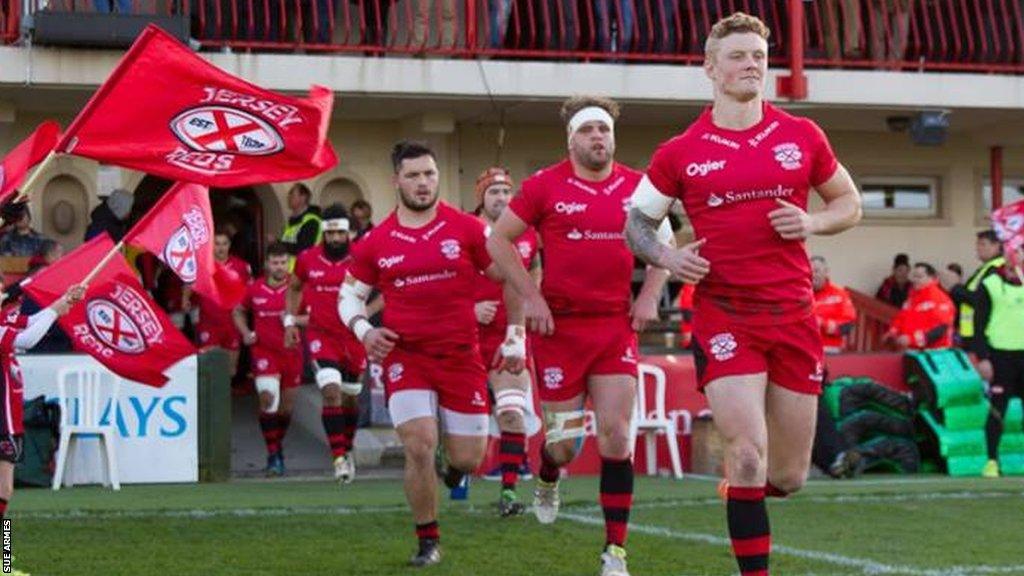
- Published7 December 2016
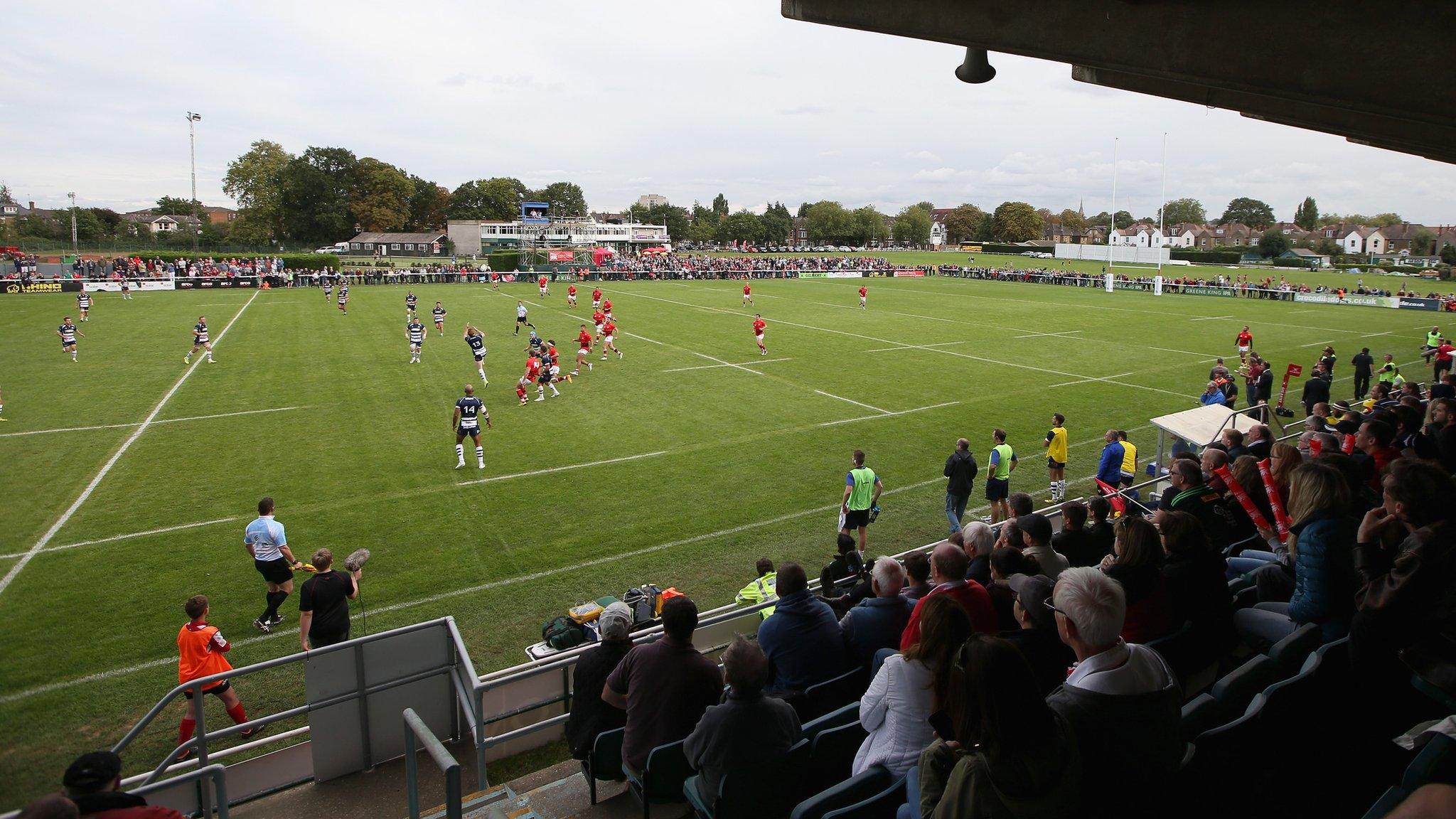
- Published9 November 2016
